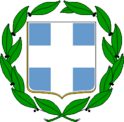- Prime Minister's website (in Greek, English, French and German)
- New Democracy website (in Greek)
- Extended biography at CIDOB Foundation (in Spanish)

Konstantinos Karamanlis (Greek: ) (born September 14, 1956), often shortened to Kostas (Κώστας), is a former Prime Minister of Greece and president of the right-conservative New Democracy party, founded by his uncle Konstantinos Karamanlis. He served as Prime Minister for two consecutive terms, winning the 7 March 2004 parliamentary elections and the 16 September 2007 parliamentary elections. However, he asked for mid-term general elections to be held on 4 October 2009 because of the narrow (1 MP) majority his party enjoyed in Parliament. The economic crisis and its repercussions were also pointed out as the reason for anticipated elections. On 5 October 2009, Karamanlis conceded defeat in the Greek legislative election and resigned as Prime Minister after an election victory for the opposition PASOK.[1]
Karamanlis, a nephew and namesake of the former President of the Hellenic Republic Konstantinos Karamanlis, was born in Athens and studied at Athens University's Law School and at the private Deree College, continuing with postgraduate studies in the Fletcher School of Law and Diplomacy Tufts University in the United States, where he gained a master's degree and a doctorate in political sciences, international relations and diplomatic history. Karamanlis was a member of New Democracy's youth wing, ONNED, and served in ONNED's and New Democracy's organisational and ideological sectors from 1974 to 1979 and from 1984 to 1989. He also practised law between 1984 and 1989 and taught political science, diplomatic history and business law at Deree College. He is the author of Eleftherios Venizelos and Greece's Foreign Relations 1928-32. He has also edited and prefaced various historical publications. Karamanlis was elected a New Democracy deputy for Thessaloniki in 1989, but in 2004 he was elected for Larissa. He was elected party leader in 1997 following New Democracy's defeat in the 1996 election. He narrowly failed to defeat the ruling Panhellenic Socialist Movement (PASOK) at the 2000 elections. Karamanlis is the youngest ever Greek Prime Minister, and the first born after World War II. He married Natasa Pazaïti in 1998 and they have two children (a boy and a girl who are twins), born in 2003.
Greek Prime Minister Kostas Karamanlis (left) and US President George W. Bush (right) , 20.5. 2004 (Photo from http://www.whitehouse.gov) Prime Ministerial Career Helped by the unpopularity of the PASOK government (a party who had been in power almost continuously since 1981) led by Costas Simitis and economic stagnation, ND defeated the Socialists' George Andreas Papandreou. Caramanlis stated that the priorities were education, economic policy, agricultural policy, lowering the large level of unemployment (standing at 11.2%) and a more transparent and effective state administration. Economic policy centered on tax cuts, investment incentives and market deregulation. However, early setbacks included a large public debt (about 112% of GDP) and a budget deficit (5.3% of the GDP) in excess of Eurozone stability rules. Another important setback was the 2004 Summer Olympics, held in Athens; several key buildings were unfinished at the time of the election, the security budget was increased to €970 million and authorities announced that a roof would no longer be constructed over the main swimming venue. The main Olympic Stadium, the designated facility for the opening and closing ceremonies, was completed only two months before the games opened, with the sliding over of a futuristic glass roof designed by Spanish architect Santiago Calatrava. Other facilities, such as the streetcar line linking the airport, the stadium and the city, were largely unfinished just two months before the games. The subsequent pace of preparation, however, made the rush to finish the Athens venues one of the tightest in Olympics history. The games were held as planned, but rising costs and budget overruns were estimated to result in a 3% deficit. [1] Both the ND government and the previous administration of Costas Simitis were criticized for the messy preparations. Under the weight of the huge costs (estimated 7bn euro), the deficit shot up to 5.3%. Caramanlis declared that "Social policy was done with borrowed cash, military spending did not show up on the budget, debts were created in secret" [2] A worse blow to the government came in May 2004, when the European Commission harshly accused Greece of "imprudent" and "sloppy" fiscal policies, pointing out that since the Greek economy was growing, it should've produced a smaller deficit [3] The government blamed the previous government of fiscal mismanagement. Rising unemployment and the threat of inflation undermined Caramanlis' promises to kick-start the economy and sparked strikes [4] [5] [6] [7], especially one in 2006 by rubbish collectors [8], causing severe disruption in the economy - particularly the one in July 2005 at the height of the tourist season. In 2006, it was revealed that the cellular phone of Costas Karamanlis, as well as those of several other members of the government and officials of the armed forces, had been tapped for several months during and after the 2004 Athens Olympics. [9]. An investigation into the matter is currently underway. According to recent polls, Caramanlis is supported by 48% of the Greek public ([10]).
Karamanlis' first cabinet, March 10, 2004–
Changes September 23, 2004 – Savvas Tsitouridis resigns and is replaced by Evangelos Basiakos as Minister for Rural Development and Food. February 15, 2006 – First cabinet reshuffle. Georgios Voulgarakis changes to become Minister for Culture, Savvas Tsitouridis returns to the cabinet as Minister for Employment and Social Protection, Dora Bakoyannis enters the cabinet as Minister for Foreign Affairs, Dimitris Avramopoulos switches to Minister for Health and Social Solidarity, Georgios Kalantzis becomes Minister for Macedonia–Thrace, Vangelis Meimarakis joins the cabinet as Minister for National Defence, Vyron Polydoras enters the cabinet as Minister for Public Order and Fani Palli-Petralia joins the cabinet as Minister for Tourism. Links Retrieved from "http://en.wikipedia.org/"
 |
|
|||||||||||||||||||||||||||



